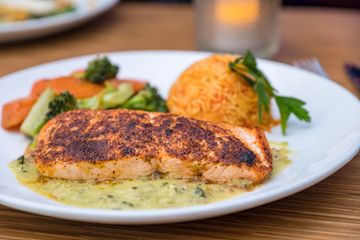Is Mexican Food Healthy? Unboxing the Nutritional Advantages of Conventional Active Ingredients
The concern of whether Mexican food is healthy welcomes an exploration of its typical components. Beans and corn function as fundamental staples, rich in healthy protein and fiber. Avocados offer useful fats, while various natural herbs and flavors include flavor and wellness benefits - churros. With each other, these components create a tapestry of nourishment. The healthfulness of Mexican cuisine typically depends on prep work methods and part dimensions. What duty do these elements play in identifying its total nutritional value?
The Power of Beans: Healthy Protein and Fiber-Rich Staples
Usually overlooked, beans serve as a foundation of Mexican food, supplying a wide range of nutritional benefits. Rich in protein, they are an exceptional plant-based choice for those looking for to meet their nutritional healthy protein requires. This high healthy protein material supports muscle mass fixing and development, making beans indispensable for both meat-eaters and vegetarians alike. Additionally, beans are a phenomenal resource of nutritional fiber, which assists in digestion and promotes a feeling of fullness, potentially assisting with weight monitoring.
The selection of beans used in Mexican dishes, such as black beans, pinto beans, and kidney beans, contributes to a varied taste profile and can improve dishes nutritionally. Beans are reduced in fat and include vital vitamins and minerals, consisting of magnesium, folate, and iron. With each other, these characteristics make beans a crucial component, supplying both nourishment and nourishment in typical Mexican fare.

Corn: a Versatile Grain With Nutritional Benefits
Corn attracts attention as a flexible grain basic to Mexican cuisine, commemorated not only for its cooking applications but likewise for its excellent nutritional account. As a main ingredient in meals like tortillas, tamales, and pozole, corn gives vital nutrients that add to a balanced diet plan. Rich in carbs, it functions as a considerable power source, while likewise being reduced in fat, making it a beneficial alternative for various dietary requirements.
Corn is a great resource of dietary fiber, which helps in food digestion and promotes satiety. It has substantial quantities of vitamins such as B-complex vitamins, which are necessary for energy metabolic rate. The presence of anti-oxidants, specifically carotenoids, contributes to total health by reducing oxidative anxiety. Furthermore, corn is gluten-free, satisfying those with gluten sensitivities. Overall, the nutritional advantages of corn emphasize its value in typical Mexican food and its role in a healthy and balanced diet.
Avocados: Healthy Fats and Nutrients in Every Bite
Avocados play a considerable function in Mexican food, enhancing meals with their velvety structure and abundant flavor. Beyond their culinary appeal, avocados are celebrated for their outstanding nutritional profile. They are an abundant source of healthy and balanced monounsaturated fats, which can assist lower bad cholesterol degrees and assistance heart wellness. In addition, avocados are loaded with essential minerals and vitamins, including potassium, vitamin E, and B vitamins, contributing to total health.
The high fiber material in avocados aids digestion and advertises satiation, making them a valuable enhancement to any type of meal. Their distinct nutrient make-up can additionally support skin health and provide anti-inflammatory advantages. Integrating avocados into traditional Mexican recipes or appreciating them as a standalone snack can boost both flavor and nourishment, showing why they are a cherished staple in Mexican food. Generally, avocados use a delicious means to take pleasure in healthy fats and important nutrients in every bite.

Flavors and Natural Herbs: Flavorful Health And Wellness Boosters
While enjoying the rich tastes of Mexican cuisine, one can not overlook the vital role that spices and natural herbs play in enhancing both preference and health and wellness. Active ingredients old town pizza such as oregano, chili, and cilantro peppers not only add to the dynamic flavor account but additionally offer significant wellness benefits. For example, cilantro is known for its detoxifying residential properties, helping to get rid of hefty steels from the body, while oregano is packed with antioxidants and possesses anti-inflammatory impacts.
Chili peppers, a staple in many Mexican dishes, include capsaicin, which has been linked to boosted metabolic rate and discomfort alleviation. Additionally, spices like cumin and coriander support digestion and may help in blood sugar level right here law. Including these savory health boosters right into meals not only enhances the culinary experience however also promotes overall well-being, making Mexican food not simply delicious, but likewise nutritionally helpful.
Conventional Food Preparation Methods: Enhancing Nourishment and Flavor
Conventional cooking techniques in Mexican food play a crucial duty in improving both nutrition and taste, as they usually focus on classic techniques and fresh ingredients. Strategies such as nixtamalization, where corn is soaked and cooked in an alkaline remedy, not only improve the nutrient account of tortillas however also boost their digestibility - happy hour. Additionally, the usage of sluggish cooking techniques, like stewing or braising, permits flavors to fuse perfectly while keeping the integrity of the active ingredients
Frequently Asked Questions
Are Mexican Food Portions Generally Larger Than Other Cuisines?
Mexican food parts are commonly bigger than those of several various other foods. This particular mirrors typical eating techniques, highlighting public sharing and hearty dishes, which can cause a much more substantial offering size overall.
Just how Does the Prep Work Technique Affect Healthiness of Mexican Food?
Prep work approaches considerably influence the healthiness of Mexican food. Methods such as barbecuing or steaming preserve nutrients, that site while frying can boost undesirable fat content. Choices of components and cooking styles inevitably determine general dietary value.
Can Mexican Food Be Tailored for Certain Nutritional Constraints?
Mexican food can certainly be customized for details dietary constraints. Alternatives, such as using corn tortillas for gluten-free diet plans or integrating even more vegetables, allow people to enjoy typical flavors while fitting different nutritional requirements.
What Are Usual Misunderstandings Regarding Mexican Food and Health?
Usual misconceptions regarding Mexican food include the belief that it is inherently unhealthy, overly zesty, and entirely concentrated on fats. In truth, standard meals usually include nourishing active ingredients and can be tailored to various nutritional requirements.
Exist Healthier Alternatives at Mexican Dining Establishments?
Much healthier choices at Mexican dining establishments typically consist of smoked meats, beans, and fresh vegetables. Picking meals that highlight whole components and staying clear of hefty sauces can bring about an extra nourishing dining experience, promoting total health.
The selection of beans utilized in Mexican dishes, such as black beans, pinto beans, and kidney beans, contributes to a varied flavor account and can improve dishes nutritionally. Avocados play a considerable function in Mexican food, matching recipes with their luscious appearance and abundant taste. Including avocados right into standard Mexican dishes or appreciating them as a standalone snack can improve both taste and nourishment, showing why they are a precious staple in Mexican cuisine. While delighting in the rich flavors of Mexican cuisine, one can not ignore the essential role that spices and natural herbs play in boosting both taste and health. Typical cooking methods in Mexican food play an essential function in enhancing both nutrition and taste, as they often prioritize classic strategies and fresh components.